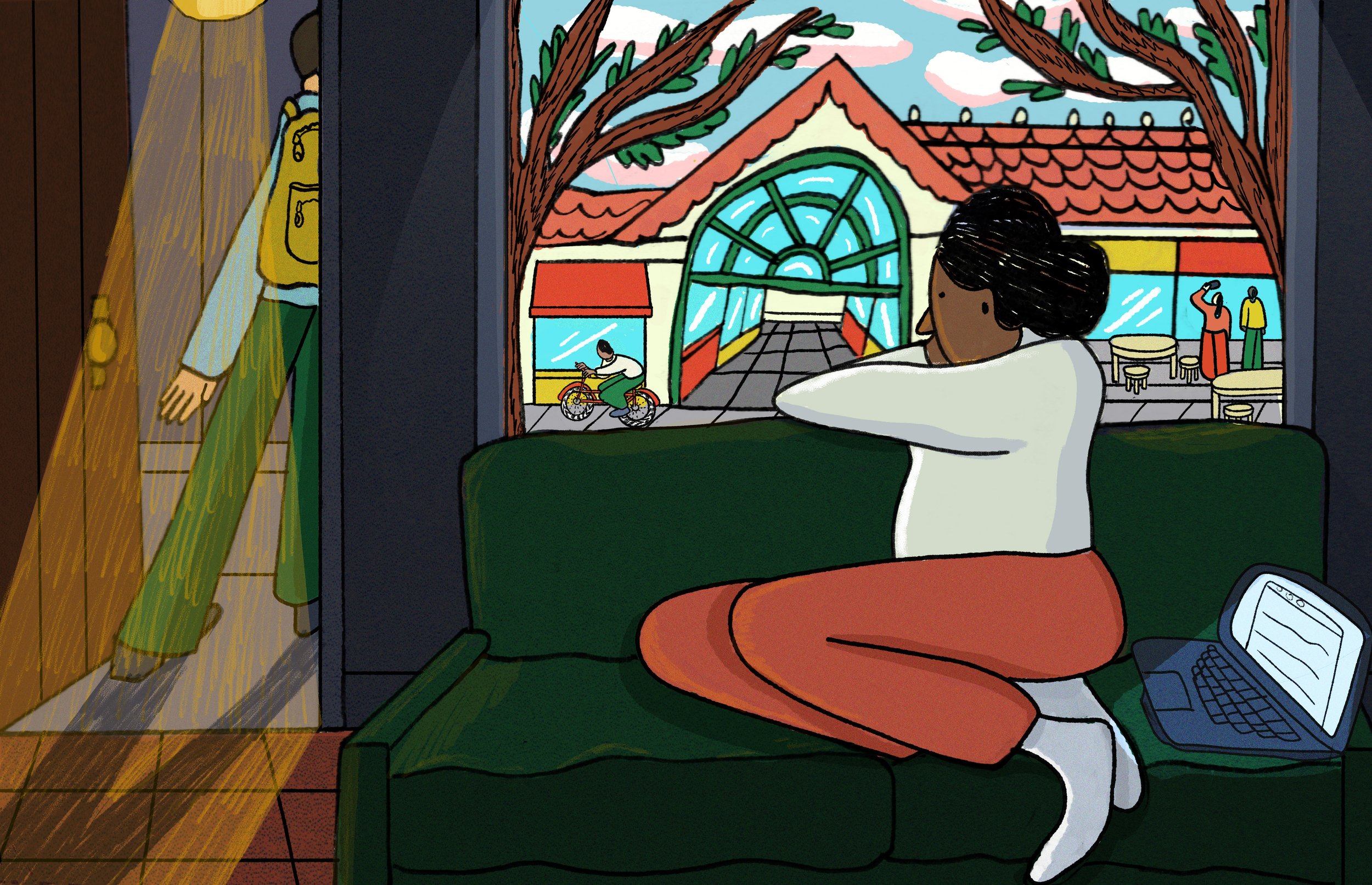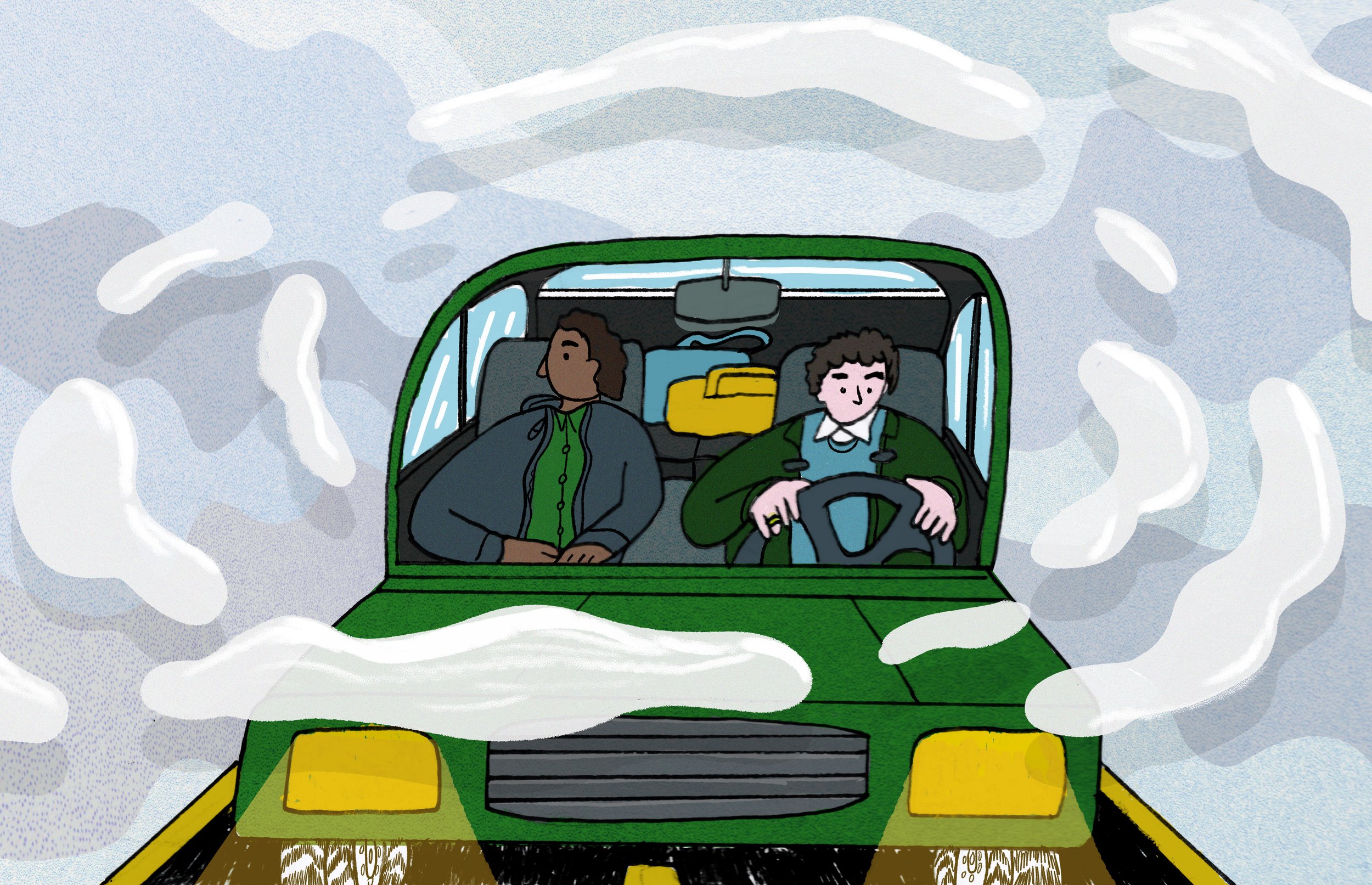8:20 p.m. in Upstate New York

8:20 p.m. in Upstate New York is an ambrosian sky over sweeping green fields punctuated by trailer parks and white-boarded homes. I’m on a walk to clear my head when I hear a large horn behind me. I’m not used to seeing my dad behind the wheel of a huge truck anymore, on his way to work the fields. Especially at 77. Especially nearing a purpling sundown, trying to beat the dark.
“Hop in,” he says. I hesitate. He waves his hand.
Climbing up into one of those machines takes a feat of thigh muscle and upper body heft I’d forgotten, and once there, I push away dirt and mounds of papers collected by farm men. Dad turns a wheel big as a beachball, and we bounce over roads with potholes and pin turns. I remember this rangy feeling from girlhood—being taken along, the free flow of air through the open window.
“Isn't it beautiful?” he says, pointing to the rolling hills ribboned with dirt roads.
It is, but I haven’t always felt that way. The country held the beauty of trees lit like stained glass in autumn. Barn cats with their fuzzy faces and wild hearts. But there was also violence, isolation, secrets.
My father is a Republican dairy farmer, and I’m his liberal, vegan Manhattanite daughter. I have memories of the brutality of the rural—getting electrocuted by a live wire fence when trying to pet a calf ’s nose, my fingers accidentally slammed in the hinges of a tractor door. The farm was a land of men, and I learned not to walk the dirt roads alone late at night. The only other girls around were the hundreds of cows, with their enviable eyelashes and gentle gaze. Watching them grow up and move from hutch, to barn, to slaughterhouse, I began to understand how unsafe some bodies were here. At fifteen I gave up meat. At sixteen I shrunk my own body with an eating disorder, as if the way to find safety was to disappear.
Dad rolls down the window. The hay is cut and ready for collecting. I watch the crop being dumped from a nearby baler into our hatch, and rains of sweet-smelling blades land on my forearm and head. Earthy and airy. I hop out and walk the field, scooping handfuls of hay and bundles of milkweed, pink and violet as sunset.
For decades, I came back here just for pockets of days, staying only as long as I could without feeling suffocated or like my nervous system was sparking with memories. But once, this land had cradled me. There’s a picture of me as a baby in this field, red hair popping out against the green.
On the ride back, I notice how my father’s own red hair is fading. How the freckles on his hands mirror my own. I feel the tender string of lineage, genetics, family bond alongside the opposite cord of our different lives: the twang of those two.
Dad gestures to the fields.
“This will be sold,” he says. “And that, too.” He means in the next month. The farm has been passed down through generations, but none of us will continue that story. Was the disappearance of this world partially my fault? I am proud of the life I harvested, the New York City apartment that greets me with its tight-space-hug, night-songs of neighbors and sirens instead of crickets and owls. The freedom I found in bright lights and anonymity, the honesty of city chaos that lives on the outside, not just hidden away. But sometimes, when I see a tractor roll up 2nd Avenue for construction, I feel the pang of guilt that I picked a path so apart.
When the place that made you can’t contain you, you belong everywhere and nowhere.
We drive back from the fields to the farm in silence.We unload the hay. Another farmer pivots a tractor over a heaping stack to pack it down. I wonder if my dad sees me like the milkweed, migratory by nature. Traveling on the wind away from the parent plant. Born here, but built to leave.
A family ritual comes back to me. I wonder what it would be like to live it, for a moment.
“I want to drive,” I say.
“Really?” Dad says.
I take the driver’s seat. Dad keeps the door open, feet on the step, standing.
“Don’t you want to sit?” I say, eyeing the seat belts.
But he says he’ll hold on. It’s almost dark. I slide the bulky lever into D and widen my arms around the giant wheel. I feel the drag, then glide. For just one moment, we share the same open road.
About the Author
Sarah Herrington is a writer and teacher based in New York. Her work has been featured in the New York Times, LA Times, Poets & Writers magazine and other outlets, and she is the author of several books on yoga. Find her on Instagram @sarah.herrington
Illustration by Jane Demarest.
Edited by Aube Rey Lescure.










